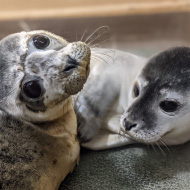RSPCA highlights increase in rescued seals

Roughly half of the world's population of grey seals live around the British coastline.
The RSPCA's wildlife centres have seen an 57 per cent increase in seal admissions.
So far this year, 328 sick and injured seals have been taken in by the charity, with the majority of these being sick, injured or orphaned seal pups.
These pups are released after rehabilitation, which typically takes between four and six months. During this time, funding is vital to protect and rehabilitate the seals.
Rehabilitating the seals involves giving them salt baths, keeping them fed, giving them veterinary medication, and using heavy-duty equipment to monitor the seals' progress, all of which is costly.
To support the influx of seals, the People's Postcode Lottery has raised £350,000 for the charity, and some of this will be shared between the four RSPCA wildlife rescue and rehabilitation centres.
Manager at RSPCA East Winch, the charity's Norfolk-based wildlife centre, Evangelos Achilleos, said: “The funding will allow us to continue helping the seals that need us the most. Less seals will suffer and their chance of being released back to the wild as healthy animals is far more likely because of the work of our dedicated teams.
“This funding will allow us to protect them, rehabilitate them and ensure that they can live happy lives free from harm back out in the wild where they belong.
“Sadly, we’re seeing an increasing number of seals with deep laceration injuries caused by plastic litter like frisbees and discarded fishing equipment which is very concerning, and so our work is needed more than ever before.
“We’ve so grateful to have the support of the players of People’s Postcode Lottery, we couldn’t do this vital work without their generosity.”



 Zoetis has launched a new survey to identify management techniques for Equine Herpes Virus (EHV).
Zoetis has launched a new survey to identify management techniques for Equine Herpes Virus (EHV).